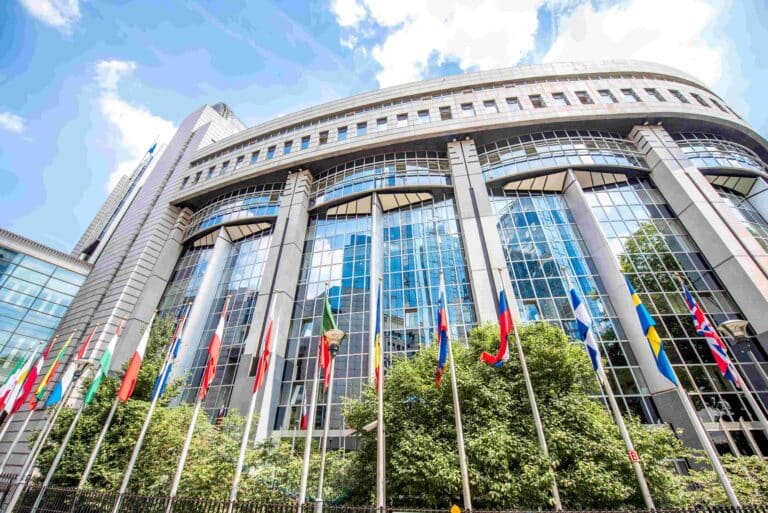Sharp, Long-lasting Slowdown to Hit Developing Countries Hard
2023 global growth to slow to 1.7% from 3% expected six months ago, according to World Bank latest forecast. In Poland in 2023, economic growth is expected to decelerate sharply to below 1 percent, in line with the much weaker growth expected for the euro area, where GDP is expected to record 0 percent growth in 2023, a 1.9 percentage points downward revision from June 2022.
Global growth is slowing sharply in the face of elevated inflation, higher interest rates, reduced investment, and disruptions caused by Russia’s invasion of Ukraine, according to the World Bank’s latest Global Economic Prospects report.
Given fragile economic conditions, any new adverse development—such as higher-than-expected inflation, abrupt rises in interest rates to contain it, a resurgence of the COVID-19 pandemic, or escalating geopolitical tensions—could push the global economy into recession. This would mark the first time in more than 80 years that two global recessions have occurred within the same decade.
The global economy is projected to grow by 1.7% in 2023 and 2.7% in 2024. The sharp downturn in growth is expected to be widespread, with forecasts in 2023 revised down for 95% of advanced economies and nearly 70% of emerging market and developing economies.
Over the next two years, per-capita income growth in emerging market and developing economies is projected to average 2.8%—a full percentage point lower than the 2010-2019 average. In Sub-Saharan Africa—which accounts for about 60% of the world’s extreme poor—growth in per capita income over 2023-24 is expected to average just 1.2%, a rate that could cause poverty rates to rise, not fall.
“The crisis facing development is intensifying as the global growth outlook deteriorates,” said World Bank Group President David Malpass. “Emerging and developing countries are facing a multi-year period of slow growth driven by heavy debt burdens and weak investment as global capital is absorbed by advanced economies faced with extremely high government debt levels and rising interest rates. Weakness in growth and business investment will compound the already-devastating reversals in education, health, poverty, and infrastructure and the increasing demands from climate change.”
Growth in advanced economies is projected to slow from 2.5% in 2022 to 0.5% in 2023. Over the past two decades, slowdowns of this scale have foreshadowed a global recession. In the United States, growth is forecast to fall to 0.5% in 2023—1.9 percentage points below previous forecasts and the weakest performance outside of official recessions since 1970. In 2023, euro-area growth is expected at zero percent—a downward revision of 1.9 percentage points. In China, growth is projected at 4.3% in 2023—0.9 percentage point below previous forecasts.
Excluding China, growth in emerging market and developing economies is expected to decelerate from 3.8% in 2022 to 2.7% in 2023, reflecting significantly weaker external demand compounded by high inflation, currency depreciation, tighter financing conditions, and other domestic headwinds.
By the end of 2024, GDP levels in emerging and developing economies will be roughly 6% below levels expected before the pandemic. Although global inflation is expected to moderate, it will remain above pre-pandemic levels.
The report offers the first comprehensive assessment of the medium-term outlook for investment growth in emerging market and developing economies. Over the 2022-2024 period, gross investment in these economies is likely to grow by about 3.5% on average—less than half the rate that prevailed in the previous two decades. The report lays out a menu of options for policy makers to accelerate investment growth.
What about Poland? “The Polish economy has proven resilient to the multiple global shocks and rebounded more sharply than previously thought from the 2020 recession, despite the war in Ukraine, the energy shock, and tighter global financing conditions. Economic growth is expected to decelerate sharply in Poland in 2023, to below 1 percent, in line with the much weaker growth expected for the euro area, where GDP is expected to record 0 percent growth in 2023, a 1.9 percentage points downward revision from June 2022. The weaker growth projection for Poland in 2023 is the result of several factors. It reflects a marked deceleration in domestic demand due to high inflation that is rapidly eroding households’ purchasing power but also the fading effect of the pent-up demand built during the COVID period and the unwinding of a large inventory cycle that contributed significantly to growth in 2022. The lagged effect of monetary policy tightening, lower demand from key trading partners, and continued negative confidence effects related to the war in Ukraine are also expected to weigh on the growth outturn this year. The National Recovery and Resilience Plan is expected to support public investment, but any delays in EU funds disbursements represent a downside risk to growth” – said Cristina Savescu, Senior Economist for EU countries at the World Bank.
Source: Global Economic Prospects







